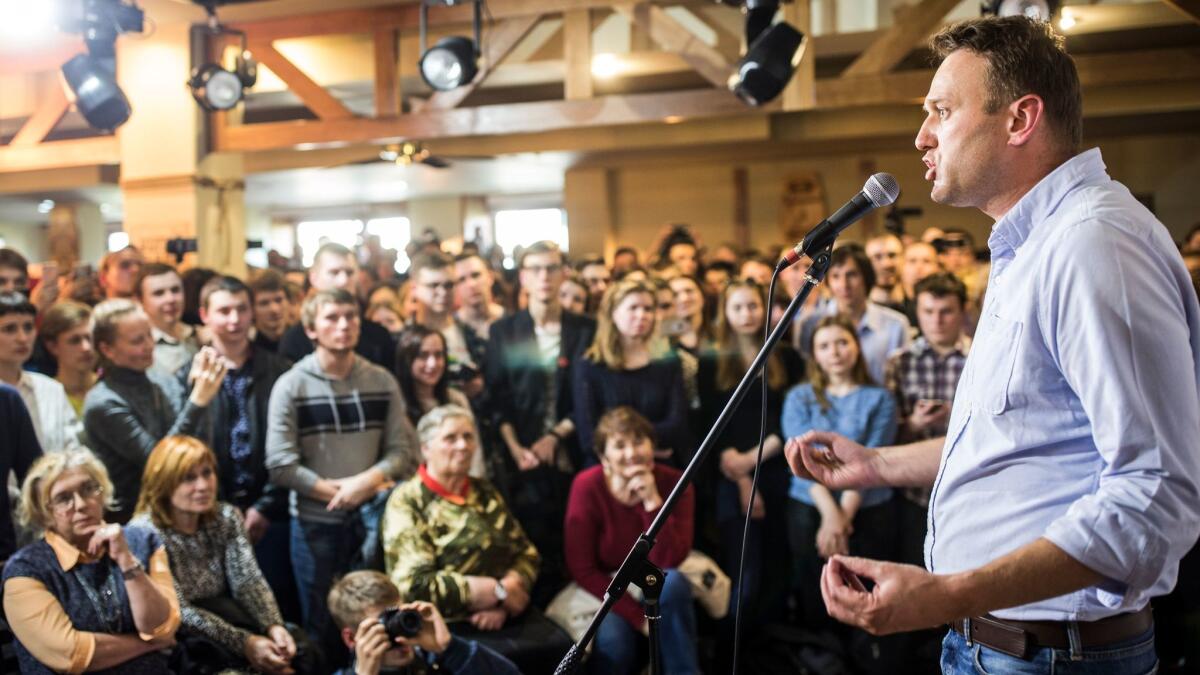Op-Ed: Itâs a life-or-death matter to run for president in Russia against Vladimir Putin

With the Russian presidential election coming next March, the political atmosphere for Kremlin critics has turned hostile, even downright dangerous. Earlier this month, Yulia Latynina, one of Russiaâs most prominent journalists and a fierce detractor of Vladimir Putin, announced she had left Russia with her family and would not be returning any time soon. Her car had been set on fire in what she says was an assassination attempt. In July, a toxic gas was funneled into the window of Latyninaâs home, and last summer a stranger poured a bucket of feces on her as she walked down a Moscow street.
For veteran anticorruption crusader Alexei Navalny, who has declared himself a candidate for the Russian presidency, such attacks have become almost routine. He was pelted with sausages recently by unknown assailants at Moscowâs Domodedovo Airport, while police stood by smiling. Last spring he was doused with a poisonous green dye and almost lost the use of one eye as a result. Navalny was unequivocal about who was behind that attack: âThe attacker was coordinated and hired by the government and administration of Putin.â He recently told CBS News that he had a 50-50 chance of being murdered. But he brushes aside the danger he faces: âI live in Russia and Iâm staying here.â
To most observers, Navalny is clearly the Kremlinâs No. 1 target. But why would Putin, who has never met Navalny or uttered his name in public, view him as such a threat? After all, Putinâs approval ratings are at 86%, and, as Russiaâs recent regional and municipal elections demonstrated, the pro-Kremlin United Russia party is overwhelmingly dominant. Apparently, Putin and his cronies have not forgotten the widespread street protests that broke out before and after his 2012 election, the largest demonstrations since the ones that prompted the 1991 Soviet collapse. And Navalny has already proved to be a lightning rod for activism.
The 41-year-old gained prominence several years ago as a vocal Kremlin critic. His Anti-Corruption Fund, supported entirely by donations, posts meticulously researched documentaries on the Internet revealing the vast wealth of Putinâs inner circle. The Kremlin has used the courts to try to intimidate Navalny, prosecuting two criminal cases against him on bogus embezzlement and fraud charges. He has been sentenced more than once to suspended prison terms, the most recent for five years, in February.
The political atmosphere for Kremlin critics has turned hostile, even downright dangerous.
A month after the February conviction, Navalny took on Dmitry Medvedev, posting a documentary that described the prime ministerâs palaces, yachts and vineyards, and his use of phony charity foundations to hide his assets. The report received 1.5 million views on the first day. When protesters all over Russia took to the streets, Navalny was locked up for 15 days, and in June, on the eve of another wave of anti-government protests, he was sentenced to 30 days in jail.
His criminal convictions make him ineligible to run for the presidency, but the defiant Navalny is nonetheless running a vigorous campaign across the country in hopes that â just as when he ran for the post of Moscow mayor in 2013 and gained close to one-third of the votes â grass-roots support will galvanize a movement to get him on the ballot. As for Putinâs daunting approval rating, Navalny said: âIn an authoritarian country, such a number is not relevant. There will be an election campaign, people will see an alternative, and this 86% will crumble.â
Navalny now has campaign offices in 80 cities. Russian authorities have raided his headquarters and harassed the campaignâs volunteers. The director of his Moscow office, Nikolai Liashkin, was attacked with a steel pipe on Sept. 15; but the harassment doesnât seem to diminish support for Navalny, who estimates his volunteer forces at 130,000. On the same day Liashkin was assaulted, thousands showed up in the rain to hear Navalny speak in Murmansk, the first stop on his fall campaign tour.
In sharp contrast to the aloof Putin, Navalny, who has endless energy, stumps like a Western-style politician. Recently, he wrote on navalny.com: âWhat should a normal candidate do in elections? Meet voters and participate in debates. These are the basic necessary requirements.â His platform is straightforward: decentralization of policy decision-making; a heavy tax on the oligarchs âwho robbed the country of resources during privatizationâ; an end to spending on military ventures in Ukraine and Syria; and âhospitals and roads, not palaces for bureaucrats.â
Meanwhile, Navalny and his researchers continue to produce hard-hitting exposes of the lavish lifestyles of Kremlin officials and their families. At the end of August, Navalny released a video showing drone footage of an enormous island mansion near the Finnish border that he claims belongs to Putin. His trademark mocking style is reminiscent of Boris Nemtsov, who published several in-depth reports on the criminal nature of the Putin regime before he was brutally gunned down just outside the Kremlin in February 2015.
In an interview with the BBC in January, Navalny, who is married with two children, was reminded of what happened to Nemtsov and asked if he realized the danger he faced. Navalny, whose political support far surpasses Nemtsovâs popularity, assured his interviewer that he was fully aware of the risks of opposing Putin. As to his motivation, he added: âThis is my country and I am going to fight for my country. I know that I am right.â
Russia scholar Amy Knight is the author of the just-published âOrders to Kill: The Putin Regime and Political Murder.â
Follow the Opinion section on Twitter @latimesopinionand Facebook
More to Read
A cure for the common opinion
Get thought-provoking perspectives with our weekly newsletter.
You may occasionally receive promotional content from the Los Angeles Times.










